Home Shop Butter, Flour, Honey Organic Cashew Butter (Raw)
In recent years, you may have heard about a range of nut butters that have become popular as alternatives to the traditional peanut butter. While nut butters have gained attention, they’ve been a staple of diets for a long time. One example is cashew butter, made from raw cashews, which was actually rationed out during the Cold War as a part of civil defense survival kits in the United States. In addition to being a healthy option, cashew butter is easy to make and a delicious addition to a number of foods.
As you might expect, the main ingredient in cashew butter is cashews. A cup of simple, plain cashews is all you really need, though most people choose to add salt or other seasonings to create some depth in their final product’s taste. You can also create flavored butters by adding things like cinnamon and sugar, or chili flakes.
For blending your cashews, you can use a variety of kitchen appliances, though most people choose a food processor or heavy-duty blender. It can take ten to fifteen minutes of blending to get the proper consistency! During blending, some people may add a touch of oil at the end of the blending process to smooth out the batter, especially if starting with raw nuts.
In short, most cashew butter contains only cashews, salt, and potentially a small amount of oil. You may also see other seasonings noted in the ingredients if you are looking for a certain flavor.
Most nut butters offer some nutrients, but cashew butter is one of the healthiest forms you can choose. While the below are some of the health benefits you can get from eating cashew butter, there are many more where these came from.
Magnesium is an essential mineral that is critical to keeping the body fit and healthy. Regular consumption of magnesium helps to keep muscles in shape and optimizes the metabolic functions and immune system in the body. In addition to these functions, magnesium can also regulate blood pressure levels and calcium absorption. Because cashews are full of magnesium, cashew butter is a great way to get enough of this mineral in your diet.
All nuts contain fat, which means all nut butters will contain fat. However, the fats found in cashews tend to be healthy, or polyunsaturated and monounsaturated, fats. Cashew butter will also contain less fat than other nut butters, especially peanut butter. In addition to less fat, cashew butter also has less sugar and calories than peanut butter, making it a healthy option among its competitors.
Though other nut butters may contain more protein, they also contain more fat and sugar, and cashew butter still offers a good amount. Especially if you don’t eat a lot of animal meat, cashew butter can easily supplement your diet and provide a vegetable source of protein.
Having enough iron in your diet is important to prevent anemia and fatigue, and cashew butter contains a good amount of iron, especially when it is made with raw cashews. In addition to iron, raw cashew butter also contains selenium. This helps improve health by fighting free radicals, stopping them from causing damage to DNA membranes and cells.
Cashews are well known as a dietary element that can improve heart health and prevent cardiovascular diseases. A healthy, functioning heart is vital to quality of life and overall health, making cashew butter good for you. The monounsaturated and polyunsaturated fats in cashews actually fight the development of high cholesterol levels, which can be dangerous. Lower cholesterol also helps reduce the risk of various heart diseases that can occur.
Diabetes is increasingly common, and while many people live with the disease, it can also lead to strict restrictions and other health issues when it occurs. When possible, it’s preferable to prevent diabetes from developing rather than trying to alter it after the fact. Cashew butter can help regulate blood sugar levels, the prime driver for diabetes.
If you’ve ever had gallbladder stones, you know they can be not only annoying but extremely painful. Cashew butter has been shown to reduce the risk of gallbladder stones, especially in women who may be more prone to them.
These are just some of the health benefits provided by cashews and cashew butter, making it a great choice for your diet!
Because of the lower sugar content, there is actually less chance of addiction-like behavior with cashew butter than other nut butters. It’s been shown that people can more easily regulate their consumption of cashew butter. However, you should still be cautious of how much cashew butter you are eating- too much of a good thing is possible. Just 100 grams of cashew butter can be enough to meet your recommended daily intake of fat, so you will want to monitor your diet to make sure you aren’t consuming too much fat.
Now that you know the health benefits of cashew butter, you might be wondering what ways you can incorporate it into your diet. The good news is that there are a number of ways you can use cashew butter that you may not have expected.
As one of the mildest nut butters, cashew butter can be used as a dairy substitute in a wide range of items. This includes sweet things, like cheesecake or smoothies, as well as savory dishes like a creamy sauce or soup. Some people will even add a spoonful of cashew butter to coffee or tea in place of milk, topped with some honey or sweetener.
Many people treat cashew butter like they would peanut butter, especially as a spread. Cashew butter can be used on a sandwich, on a piece of toast, on fruit, or even eaten by the spoonful.
Cashew butter can also be incorporated into a number of full entrees. As a sauce on chicken skewers or an ingredient in your pasta sauce, cashew butter can add nutritional value while maintaining a strong flavor and consistency in your meals.
Cashew butter can be made using a base of either raw or roasted cashews, depending on what you are going for. While both will work for baking, some people have a strong preference.
Roasted nut butter tends to have a richer flavor, making it the primary choice for use on crackers or toast, as well as for pairing with fruit. When looking to replace dairy, such as in dressings or dips, raw is often chosen. Both forms will work for baking unless your recipe calls for a specific form of the butter.
One thing to keep in mind is that roasted nut butters may go rancid more quickly than their raw counterparts, as the roasting leaves them vulnerable to oxidization from the air. Any nut butter will last longer if it is kept in the fridge.
Whether you want to try our raw and roasted cashew butter or make your own, the most important element will be the quality of the cashews used as a base. All cashews at Beyond the Nut are fair trade, GMO-free, vegan, and gluten-free, giving you a head start on your healthy snack.
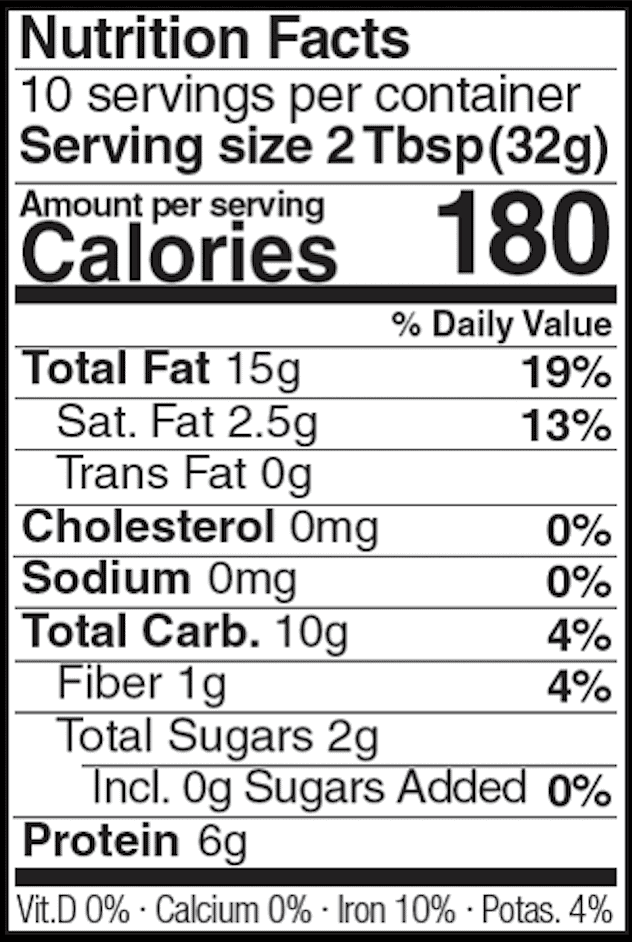
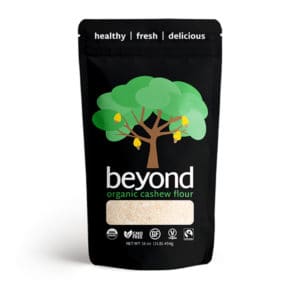
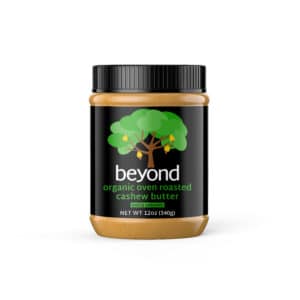
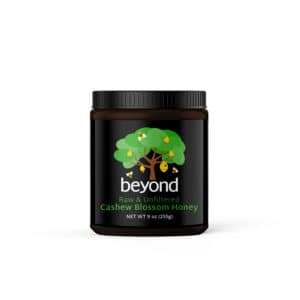
snack size
Sale!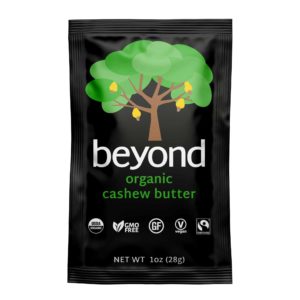
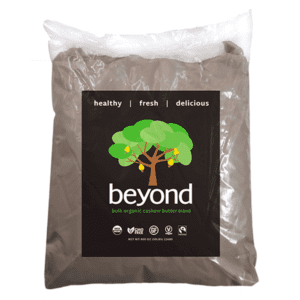
Free shipping on all U.S. orders over $25! Dismiss
7 reviews for Organic Cashew Butter (Raw)
Korey Bowie –
I like using this in my smoothies or just as a snack with some apples and chocolate chips! It’s creamy and the flavor isn’t overwhelming, which is good in my book.
Marla Bowie –
Absolutely the best cashew butter. My kids normally eat PB and I let them try this now they’re hooked to cashew butter and jelly sandwiches. I love the creaminess and use for my daily snack with fruit and/or veggies. Think we need to order more already.
W Richard Barnhill –
Wow. Very smooth and sweet, but No sugar added.
Heather Beaudin (verified owner) –
This is the best cashew butter I have ever had. It’s so smooth and creamy. I also cannot keep my kids away from it haha they keep hunting me down for my cashew butter!
Dr Mary Felton NBCT MBA –
2-level tsp of the raw cashew butter in my husband’s cup of black coffee blended with our handheld electric whisk results in a smooth, delicious, and nutritious AM or PM treat.
PhoneNumber tracking –
Your blog enlivens my day like a beam of light. Thank you for spreading positivity through your words.
Marilyn Logan (verified owner) –
The best cashew butter. So velvety creamy and delicious. I love it on my favorite toasted bread.